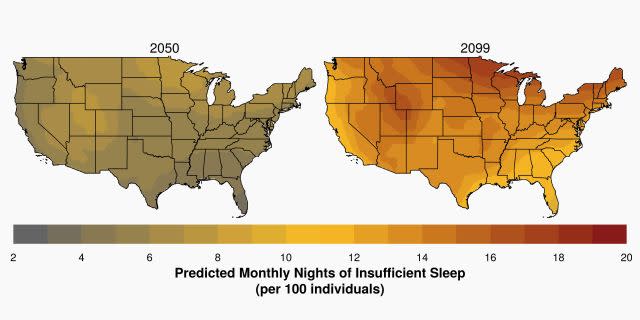Climate change is making us sleep worse

As the Northern Hemisphere slides into summer, a familiar ritual begins for some: Wake up in the middle of the night to find yourself drenched in sweat, kick off the covers or turn on a fan, and try to fall back asleep.
Sleep scientists know that a person’s internal (or “core”) temperature is directly related to their ability to sleep through the night—and typically, the warmer you are, the worse your sleep. Body temperature is part of our circadian rhythm: At night, the average person cools off, settling into a lower core body temperature than during the day. Disturbances to that rhythm can mean disturbances to sleep. Research has shown that insomniacs, for example, tend to have higher core body temperatures at night.
Adding climate change to the mix is likely to rob millions more people of their ability to sleep through the night in the US, according a paper published Friday (May 26) in the journal Science Advances.

The researchers used data from the US Centers for Disease Control’s massive Behavioral Risk Factor Surveillance System (BRFSS), where CDC employees randomly dial 400,000 people each year and ask them questions about their health.
“They’re continuously collecting—it’s the largest public health survey in the world,” says Nick Obradovich, a post-doctoral fellow at Harvard University’s Kennedy School and research scientist at the MIT Media Lab. Obradovich studies the social impacts of climate change and was the lead author on the recent paper. “The operator will ask things like whether you use your seatbelts, or how many drinks you had in a week. Lucky for us, they also ask ‘In the last 30 days, how many nights of disturbed sleep did you get?’” For each call, the operator also records the date and the respondent’s city.
Obradovich and his co-authors took answers from 765,000 people who responded to the survey between 2002 and 2011, and combined it with nighttime temperatures from weather stations taken in their cities during the month of the call. They found that when a city had a heat wave, or even just a slightly warmer-than-average month, more of the respondents in that city said they lost sleep.
Using statistical models, they found that for every month with an average temperature 1°Celsius higher than normal, three out of every 100 people lost about a night of sleep. And since data from the National Oceanic and Atmospheric Administration show 16 of the warmest 17 years on record have occurred since 2000—and with temperatures generally trending up in that time period—the months of unusual heat included in the study are part of the larger trend of climate change, rather than random variation.
Three out of 100 “might not seem like much,” Obradovich says. But if extrapolated to the whole US, “that would be on the order of 9 million nights of sleep lost that month.” Extrapolating out to the whole planet, and to 365 days, you get roughly 110 million nights of sleep lost per year, according to the paper. Sleep loss ripples into myriad health-related consequences: “Too little sleep can make a person more susceptible to disease and chronic illness, and it can harm psychological well-being and cognitive functioning,” Obradovich said in a press release.
Among people 65 and older, the impact of climate change on sleep was more extreme; they lost on average double the nights of sleep compared to the under-65 set. The paper also found that people who made less than $50,000 per year slept three times worse than people whose income was higher than that. Obradovich imagines the difference can probably be chalked up to the financial wherewithal to purchase and run an air conditioner.
When the researchers applied NASA’s projections for climate change temperature increases by 2050 and 2099, the accompanying sleep loss got worse and worse. Of course, extrapolating sleep patterns into the future has its limitations, Obradovich said. “We don’t really know what sleep in 2099 will look like, exactly. Technologies could change the way people sleep. More people might buy air conditioners. Other effects of climate change [can] impact sleep much more.” But he thinks the bottom line is clear: Climate change will rob us of shut-eye, and that will be bad for our health.

Sign up for the Quartz Daily Brief, our free daily newsletter with the world’s most important and interesting news.
More stories from Quartz:

 Yahoo Finance
Yahoo Finance 